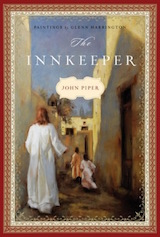Christine Hoover post: Thanksgiving Is a Taste of Home
I grew up in East Texas, where the chicken is fried, the pine trees grow tall, and the accents drip thick with “honeys” and “bless-your-hearts.” And on Thanksgiving, it was my family’s tradition to take the two-lane-highway straight-shot over to my grandparents’ house for lunch.
I’d perch on a stool in the kitchen to watch my grandmother turn “a little of this and a little of that” into a traditional turkey feast, or run with my sister through the leaves that the huge oak had molted in their backyard, seemingly for our pleasure alone.
After second and third helpings of Thanksgiving dinner, my grandfather would send me to the freezer for the Blue Bell ice cream. He’d dish it out on top of oversized slices of pecan pie for each family member, and we’d all retire to the living room to watch the Cowboys game or take a nap — or contentedly combine the two.
Longing for Home
When I think of Thanksgiving, I think of home, and when I think of home, I think of my grandparents’ house in East Texas on Thanksgiving Day. I smell fried chicken crackling on the stove. I hear my grandfather “spinning yarns” about growing up in the Depression or going to war or working in the oil fields. At the table, I see my parents in their youth, my sister and my cousins playing at cards, and the aunt who taught me to drive in the high school parking lot down the road.
This is still my home, although I don’t live in East Texas anymore. I find myself saying “you guys” far more than “y’all,” and my grandparents recently moved out of their house into assisted living. Their huge oak tree was felled by a storm years ago, and now I’m the one standing at the kitchen counter arranging pecans on the pie while my kids look on.
The world has shifted with age and time, and the will of God has taken me from my home, but my longing for it has only grown stronger. Some might call this longing homesickness. Others might call it sentimentality or nostalgia. Still others, a desire for the simplicity of childhood.
But do we not all long for home?
Do we not all long for that feeling of settledness, of familiarity, of being known in all of our ages and stages?
Do we not, even more, long for a place, a time, or an assuredness that all is right with the world, that it’s been freed from its turmoil and unspeakable atrocities?
Whether our home has been in a high-rise in the city or a farmhouse tucked away in some far-flung place, we think back with warmth to the traditions, the smells, the tastes, and the voices at the table.
We who’ve not had a sanctuary in our youth try to create it for our own children. We desire the simplicity of a satisfying meal and togetherness with others around a table. We long for an eternal peace. We crave time to stop, that we might try to fully ingest the overarching story of our lives and God’s gracious hand weaving there throughout.
Something We Receive
My grandmother will not whisk gravy at her stove this Thanksgiving, but I have learned home from her, and I have become the whisker and masher and baker. I will make mashed potatoes for my sons, and perhaps while I work at peeling them, my boys will perch on a stool at the counter and watch, taking in the sights and smells. More likely, they will wrestle in the leaf pile or run through the house with their cousins while the Cowboys game blares in the background.
Home, I’ve realized, is something we receive, something created and cultivated for us. I work tirelessly to create a place, a feeling, of “home” for my children, but my feeling of home is what was created for me. I imitate what I saw and smelled and learned from those before me.
We’re all, in effect, imitating the One who’s set a longing for home in our hearts. It is a whisper we must lean down to hear, an invitation to carefully investigate. We think the longing calls us back to the places and faces we’ve known, back to the traditions and tastes we’ve enjoyed. Instead, it is coaxing us forward, to look for the place and the face we’ve not yet known by sight. We know by faith what we’ve not yet seen, but we only know it now as longing.
Our Christ is preparing a home for us, you know.
The longing rises, even in the midst of our thankfulness. Something is not yet complete. The world strains under its own pressure. Our hearts cry out — for redemption, for settledness, for rest from this darkness and this flesh. We cry out for our God. The ultimate longing underneath all we crave is to be at home with him, at the table, studying every contour of his face, hearing the tenor of his voice, enjoying his delight, trying the heavenly mashed potatoes, and relating to others without sin. Perhaps the only remaining holiday in heaven will be Thanksgiving.
Home That Is Ahead
In this liminal space, we live with thankful longing. We know that the world has been set right, and this is why we’re thankful, but its rightness is still being disseminated. We are left longing, because God is not yet done pursuing. We must humbly give him space for his own longing.
In this in-between, we create imitations of our real home through the table, the talk, and the giving of thanks. When we gather with friends and family and lift our meager words of thanksgiving to God, we pause the advance of age and time if just for a moment and, with our traditions and tastes, foreshadow our heavenly home. As we will do there, we turn our attention to the host, who has provided a bountiful feast of celebration and gladly serves all who’ve accepted the invitation to the table. We enjoy the company of our brothers and sisters, named so by blood. We accept with gladness the offered food that satisfies and cup that quenches. We receive all we’ve been given ⎯ oh how much! ⎯ with humble thanksgiving and, here only, a prayerful desire for more.
Friends, let this Thanksgiving be a taste of home. Make your family’s traditional foods, watch your family’s traditional movies, and play your family’s traditional games. And when a twinge of longing attaches to your thanks-giving, remember that this was set in our hearts by the great Giver.
We’re all hungry. We’re all thirsty. We’re all weary and heavy laden. Let the longing for a true north lead you to Christ and an anticipation of what’s to come. In your rest from work, know that he who began a good work in us will carry it to completion (
Philippians 1:6). Pass out appetizers of grace and truth, preparation for the feast to come. Love wildly. Forgive tirelessly. Thank him unabashedly. In all things, imitate and anticipate the final Thanksgiving table and a place where all our longings will finally find their home.


